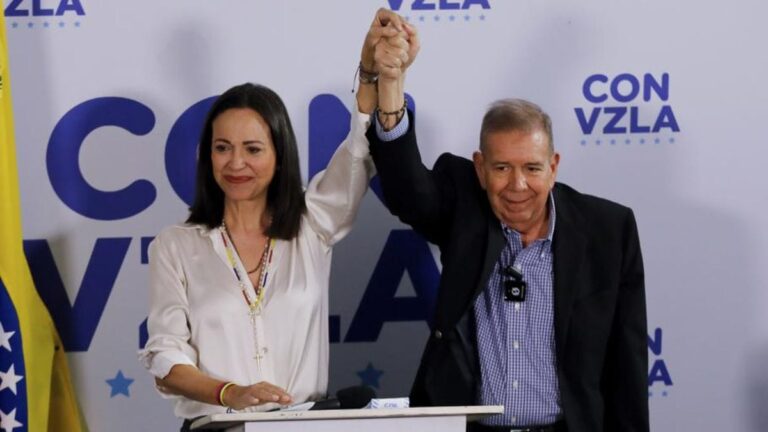Opposition presidential candidate Edmundo Gonzalez, right, and opposition leader Maria Corina Machado join hands during a press conference the day after the election, Monday, July 29, 2024, in Caracas, Venezuela. AP
Venezuela’s presidential election, held on Sunday (July 28), was one of the most peaceful in recent history. But the situation after the election is very different.
Thousands took to the streets after electoral officials declared President Nicolas Maduro the winner, giving him a third six-year term in office. Most of the demonstrations were peaceful, but tensions escalated after riot police used tear gas to disperse demonstrators who clashed with police.
The opposition claims that their candidate, Edmundo Gonzalez, won the election and says they have evidence to back up their claim.
“Evidence” of the Opposition’s Victory
Venezuela’s ruling United Socialist Party, led by President Maduro, tightly controls the voting system through a loyal five-member electoral council and a network of long-time local party coordinators.
These coordinators had near-unlimited access to the voting centers, and reportedly prevented opposition representatives from entering them to witness the voting process and vote counting, or obtain copies of the final machine tally.
Despite the challenges, opposition candidate Edmundo Gonzalez and opposition leader Maria Corina Machado announced on Monday they had proof of victory. They claim they have more than 70% of the votes counted in Sunday’s election, with Gonzalez receiving more than twice as many votes as Maduro.
“I speak the truth calmly,” Gonzalez said as supporters cheered outside his campaign headquarters in Caracas. “We have in our hands the tabulations that prove our decisive and mathematically irreversible victory.”
Gonzalez and Machado called for calm and urged supporters to gather peacefully and celebrate their victory. “Dear friends, I understand your indignation, but our response from the democratic side will be calm and firm,” Gonzalez said.
What next?
Countries such as the United States and Chile have expressed serious concerns about the electoral process, with Chile’s left-wing leader Gabriel Boric calling the results “hard to believe.”
US Secretary of State Antony Blinken said Washington had “serious concerns” that the published tally did not reflect the actual number of votes or the will of the people.
The National Election Commission has yet to release an official tally from the 30,000 voting machines, leaving the final result unclear.
Independent election observers and the European Union called on electoral authorities to publish the results promptly.
Input from AP
Find us on YouTube
subscribe

